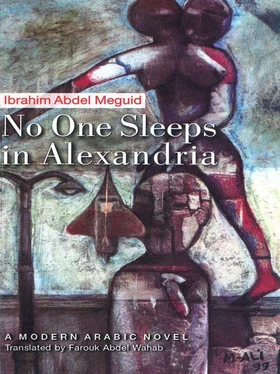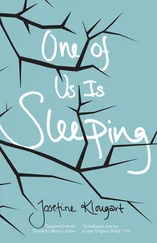None of that crossed Rushdi’s mind when he met Camilla and suggested to her that they take a boat ride together on Mahmudiya in the morning, contrary to what all lovers did. She always liked this contrariness in him, but she was afraid that he might ask that they begin at Karmuz. He smiled and said they would begin at Nuzha, far, far away from the city. Usually Nuzha was the last destination for rowboats, then everyone went hack westward. But they would rent a small rowboat and go cast, where there was no one, just agricultural land and peasants in the fields, no buildings or workers or anyone related to her or to him.
The sky was clear, to the lovers’ delight. A light rain fell as they were getting off the streetcar at the last stop, but it lasted only a few seconds. They walked under the huge camphor trees, whose branches embraced and whose leaves made quick dancing circles of shadow on the ground below. He took her hand as they went down the three steps to the colorful rowboat dock. Apparently many young men and women had the same idea. “See, we’re not alone here. Most of them have more courage — they’ll take the boats to Raghib and Karmuz.”
She said, smiling, “Let’s be cowards today. Just today.”
She sat in front of him in the narrow, sleek rowboat, and he sat and began to row. Once again it rained, which bothered them a little, but the rain was only a drizzle and it soon stopped. “How about if we get ahead of all the others? We want to be alone. Row with me.”
She took hold of the two oars. He put his palms on her hands and their warmth warmed him. They began to row fast. As his hands pressed down on hers, she felt pain and began to shift her fingers, so he moved his hands from hers, but they kept rowing and laughing.
After Nuzha, Mahmudiya had wild grass growing on the banks. As they rowed, swallows flew up from the vegetation. Now they were really alone. On both sides huge vegetable fields extended, and on the banks they began to see camphor trees, castor-oil plants, eucalyptus, and willows, known among the people as “bride’s hair,” as Rushdi told her. Camilla had read about it, but had not seen one before. There were a few peasants in the fields, a few scattered men, women, and children. They came across only one water wheel, a few sycamores, and a mighty oak standing alone in the middle of the fields.
“We’ve gone too far, Rushdi,” she said, then looked at her watch. “We’ve been rowing for two hours. We only rented the boat for one hour.”
“Don’t worry, I have fifty piasters, my monthly allowance. I’ll spend it all today.”
They stopped rowing. The rowboat stopped in the middle of Mahmudiya, and a light current carried it to the bank, where it rested.
“We can get off here. Don’t be afraid, the boat will not move,” he said, and as he stood up the boat swayed under his feet. He almost fell, but he kept his balance. She laughed. A long time had passed, and he had a hard time stretching his legs. She also stood up, and the boat shook, but she had given him her hand, and he was now on land, so he helped her off the boat and pulled her up. They were standing on the edge of a huge expanse of green fields, over which the sun was smiling kindly.
“How wonderful! What more could we ask from the gods?” He exclaimed as he stretched his arms fully. “Let’s run!”
He ran and she ran behind him. He stopped running only when he heard her having difficulty breathing. He threw himself to the ground next to a big sycamore, stretching out his legs and leaning back against the trunk of the tree. She did the same thing. They were breathing fast. Her legs glistened above her short white socks. When she saw that her knees were showing, she placed her leather school bag on top of them. He raised his left arm and embraced her, pulling her toward him. She clung to his thin, fragile chest.
“This is the best place in the world for madness!”
She drew back, apprehensive of what he had just said, and moved her chest away, but he said, “Don’t be afraid of me, ever. I only felt that I would die in front of you.”
Once again he was saying strange things.
She heard the sound of a crow, and she was startled. He told her that the crow was a poor bird; it was the crow that taught man the greatest secret, that of burial, and yet it was the most maligned of the birds. He asked her if she had read Sophocles’ Antigone, and she said she had read it last summer in the holiday reading program.
“All Antigone did was bury her brother’s body. Humanity can’t have dignity if the dead aren’t buried.”
She fell silent for a few moments.
“Did you bring me here to talk about death?” she finally asked.
“The problem is, I only read literature,” he said with a laugh. “I haven’t come across a funny story yet. If you find one, please let me know.”
He got up. “Don’t move,” he told her. “Today I’ll read you some brilliant, crazy poetry.”
He took a small notebook out of his bag. “I translated it for you just this week.” Then he began to recite:
O clock, sinister, impassive, frightening god,
Whose threatening finger says to us, “Remember!
Soon the vibrant sorrows, like arrows
Will hit the target that is your heart.
Pleasure, ephemeral, will take flight toward the horizon
Like a sylph making a hasty exit to the wings;
Each instant gnaws a piece of the delight
Given each man for all his life.
Three thousand six hundred times every hour, the second
Whispers: Remember! In an insect voice,
The Instant says: I am the Past,
I’ve sucked out your life with my loathsome proboscis!
……………….
Soon the hour will strike when.
Everything will tell you: Die, you old coward! It’s too late!”
She admired his performance and his recklessness, with his half-closed, perpetually sad eyes, his fragility in the midst of the great, green space, that very tender being who could be carried away like a feather in the wind, never to return. And yet it was to that same being that all the open space and all the greenery submitted. He was the master that the gods had made, not knowing that he would be rebellious, always aiming to play their role. That also would be the cause of his perennial anguish.
He reached out and held her hand, and she left her bag next to his and stood up. He leaned her against the trunk of the tree. Three egrets flew from the tree when he started kissing her neck, as she made faint gestures of resistance.
“I’m sorry. I really don’t know why I’m speaking about death today,” he said.
“Enough,” she said as she placed her hand on his shoulder. He had gotten used to her doing that, and she had gotten used to his backing down. She took his hand in hers as they walked along the edge of the field.
“I liked that a poet should write about a wall clock,” he said. “The poem is by Baudelaire and is called “L’Horloge.” I didn’t realize it’s tone was so dark until I had worked on it and I did not stop. Next time I’ll translate cheerful poems for you — I’ll translate crazy poems by Rimbaud and Verlaine.”
She did not say am thing. They walked in silence. A peasant, his wife, and two children emerged from a cottage and watched them in surprise; they had never seen anyone so clean, young, and beautiful.
“Don’t be afraid. Don’t talk to them,” he said and gripped her hand. When they reached the peasant and his family he said, “May peace be upon you,” and they quickly replied, “And upon you peace, Please come in.”
He smiled and she smiled, and they headed back to the tree as the peasant and his family continued to watch them in surprise. The clear day and the gentle breeze had added to their glowing looks. They heard the peasant woman saying, “City folks are so pretty!” They laughed and hurried to the tree. They must have rowed a great distance, if the woman spoke of them as city folk. They had gone deep into the countryside, or so they thought. Rushdi raised his head toward the sky and looked at the sun overhead. He said to himself, “The clock, alwavs the clock,” and took her by the hand to the rowboat, still where they had left it. They sat facing each other, with the oars between them. He started rowing and as soon as he got to the middle of the canal, she placed her hands on his and said, “I’ll help you.”
Читать дальше












